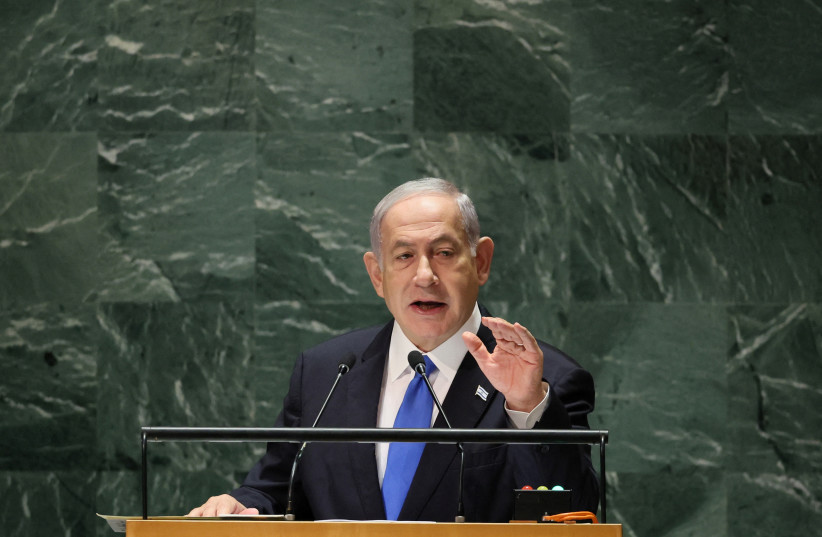In the esteemed halls of the United Nations General Assembly, leaders from across the globe step onto the world stage to articulate their visions of a brighter future. It is within this arena of diplomatic theater that Prime Minister Benjamin Netanyahu, a seasoned political maestro with an affinity for the limelight, delivered an address that transcended mere political rhetoric on Friday.
It was a symphony of diplomacy and global ambition, reminiscent of the strategic pragmatism exemplified by the late president Shimon Peres.
At the heart of Netanyahu’s oration lay a profound aspiration: to forge a “new Middle East.” With the deftness of a skilled conductor, he employed a visual metaphor, juxtaposing old maps with new, a nod to the transformative power of peace, much as Peres had done in his time.
Netanyahu’s words resonated not just with the international audience but were a clarion call to his fellow Israelis, particularly the Jewish population, to rally behind his vision.
Notably, Netanyahu artfully sidestepped the weighty domestic issue of Israel’s internal judicial reforms. Instead, he chose to pivot towards themes deeply ingrained in the Israeli psyche: peace, security, the fight against antisemitism, and harnessing technology for global betterment. In this strategic shift, he sought to rekindle the optimism and unity that Peres had championed during his tenure.

The prime minister’s emphasis on the transformative potential of peace with Saudi Arabia hearkens back to the foundational principles of the Oslo Accords, long upheld by Peres. It represents a calculated departure from past strategies, as Netanyahu aims to forge alliances with Arab nations independently of the Palestinian conflict. This calculated maneuver seeks to diminish Israel’s regional isolation while fortifying its strategic standing.
Netanyahu’s call for an end to Palestinian antisemitism and payments to terrorists served as a stark reminder of the intricate Israeli-Palestinian conflict. It positioned Israel as a bulwark against hatred, casting the prime minister as a global advocate for Jewish interests.
His unwavering focus on the Iranian threat reflects his longstanding foreign policy agenda. By rallying international support against Tehran’s nuclear ambitions, Netanyahu strategically positions Israel as a pivotal player in global efforts to curb Iran’s regional aspirations.
Israel, an AI superpower
Moreover, Netanyahu’s foray into the realm of artificial intelligence underscores Israel’s commitment to technological innovation. While cautioning against its potential misuse, he showcased Israeli AI as a force for good, further enhancing Israel’s reputation as a global tech powerhouse.
Netanyahu’s diplomatic engagements with world leaders, even in the face of political polarization and pressing domestic issues, underscore his political astuteness. His ability to compartmentalize domestic and foreign policy projects an image of stability and continuity.
A noticeable shift in Netanyahu’s approach is evident. He has transitioned from being a passionate warrior determined to assert his way as the only way, challenging Western world leaders’ perceptions of Israel, to a statesman building a platform and narrative conducive to forging a new Middle East.
Israel, despite its flaws and internal divisions, now stands as a regional superpower. Netanyahu has provided nearly every Israeli with an opportunity to take pride in their country and themselves.
Those who oppose Netanyahu should also embrace this narrative and strategy. Failure to do so risks hypocrisy. Peace with Arab neighbors is in the interest of all Israelis, regardless of their background or political affiliations.
Beyond the UN, thousands of Israelis and American Jews protested against Netanyahu and his government during his speech.
Their demonstrations are legitimate expressions of democratic dissent. However, it is imperative that they recognize the positive aspects of Netanyahu’s diplomatic achievements. Failure to do so could lead to extremism within the Israeli discourse, hindering the creation of genuine dialogue.
In conclusion, Netanyahu’s UN speech transcended the realm of political rhetoric. It revealed a leader resolute in leaving an indelible mark on the world stage while deftly navigating the complexities of global issues and formidable domestic challenges.
Netanyahu has demonstrated a willingness to take bold and dramatic steps toward peace. Embracing these efforts while constructively criticizing when necessary is the path forward for a nation seeking a brighter and more secure future.
